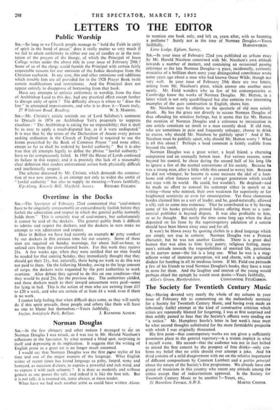SIR,—In your issue of February 22nd you published an urbane
essay by Mr. Harold Nicolson concerned with Mr. Nicolson's own attitude towards a number of matters, and containing an occasional passing reference to the late Norman Douglas—a piece, incidentally, curiously evocative of a brilliant short story your distinguished contributor wrote some years ago about a man who had known Oscar Wilde, though not very well. In your issue of February 29th there are two letters, arising from Mr. Nicolson's piece, which answer one another most neatly. Mr. Field wonders why so few of his contemporaries at Cambridge know the works of Norman Douglas. Mr. Hutton, in a letter which is not only quadrilingual but also contains two interesting examples of the quin construction in English, shows him.
Mr. Nicolson says he objects to the spectacle of old men noisily drunk. He has the grace not directly to accuse Norman Douglas of thus offending his sensitive feelings, but it seems that for Mr. Hutton the mention of Norman Douglas and a reference to intoxication in one article constitute an insult to a man recently dead. If old men, who are sometimes in pain and frequently unhappy, choose to drink to excess, why should Mr. Nicolson be publicly upset ? And if Mr. Nicolson must be publicly upset, why should Mr. Hutton worry ? What is all this about ? Perhaps a loud comment is faintly audible from beyond the tomb.
Norman Douglas was a great writer, a loyal friend, a charming companion and an unusually honest man. For various reasons, some beyond his control, he chose during the second half of his tong life to ignore a few of the normal conventions of his society. Because he was a strong man, after a little while this ceased to worry him. Because he did not whimper, he became in some measure the idol of a foot- loose and often fatuous sector of a younger generation which could not cope with its world. He could, but wouldn't. He despised—and he made no effort to conceal his contempt either in speech or in writing—those who mistook their own weakness for superiority or for heightened sensitivity or even for emancipation. Yet these clamorous hordes claimed him as a sort of leader, and he, good-naturedly, allowed a silly cult to come into existence. That he contributed to it by having some of his books privately printed before offering them to a com- mercial publisher is beyond dispute. It was also profitable to him, or so he thought. But surely the time came long ago when the dust deposited on his fame by the supererogatory adulation of a coterie should have been blown away once and for all.
It won't be blown away by quoting clichés in a dead language which are simply not true in context. Norman Douglas was a Protean character, but he was not another Goethe. There is a great deal human that was alien to him: lyric poetry, religious feeling, ninny men's attitude towards the responsibilities of married life, patriotism in its narrow sense—the list is a long one. What he was is a mag- nificent writer of immense perception, wit and charm, with a splendid disdain for humbug in all its insidious forms. If Mr. Field can persuade a few of his friends to read Norman Douglas's books, they have a treat in store for them. And the laughter and interest of the young would perhaps chisel the epitaph he would most desire.—Yours faithfully,


































 Previous page
Previous page